Canon NS Rangefinder Camera
A Description of the Canon NS Rangefinder Camera Produced 1940-1942
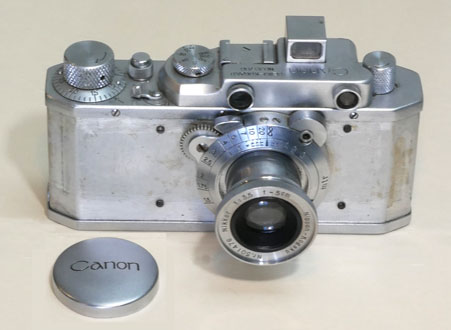
my Canon NS of 1940 with its old body cover fallen off
The Canon NS or 'New Standard' of 1940-1942
After the Hansa Canon introduced in 1935-1936 and the Canon S introduced in 1938, Canon decided to develop a further new version. Like the Hansa Canon and unlike the Canon S, the Canon NS was developed without slow speeds. As you will see in the photograph of my Canon NS, in which the flimsy war-time body cover had fallen off before I acquired it, the Canon NS body had no hole for a slow speed dial, nor any solder filler to a hole. However, Peter Dechert observes that some of the last assemblies of the Canon NS used left-over Hansa Canon bodies with the slow speed hole simply covered over by the body cover material.
Canon NS Characteristics
Peter Dechert states that this camera was advertised as 'Canon new standard model without slow speeds.' 1 Although Canon seems not to have referred to the camera with a model name, Dechert and others now refer to this model as the "Canon NS" for 'new standard'. He dates the production of the camera to 1940, 1941, 1942. Dechert estimates that only about 100 units of this camera were produced during that period, during war-time conditions.
Peter Dechert also in his fine book Canon Rangefinder Cameras 1933-1968 1 includes a photograph of a Canon NS with an Albada-type viewfinder attached. Seiki-Kogaku had sold this type of viewfinder as an accessory even before the Hansa Canon. (Albada-type viewfinders were named after a Dutch optical designer, and this design was featured on a number of cameras beginning as early as 1900.)
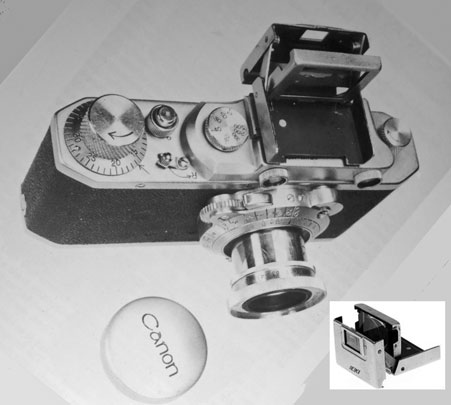
Peter Dechert photograph of a Canon NS with and Albada-type viewfinder attached
The actual Canon NS pop-up viewfinder, like the Canon S was released by a small button on the camera back.
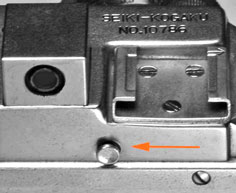
Canon NS finder release
Canon NS Lens and Mount
The Canon NS employed the same Nikkor focusing mounting used in the Hansa Canon and the Canon S. These was supplied by the optical company Nippon Kogaku Kogyo - 日本光学工業株式会社 or "Japan Optical Industries Co., Ltd. who were not yet making cameras themselves. Due to war time conditions, the supply of this Nikkor focusing mount, as well as the Nikkor lens itself may have limited the relatively small number of Canon NS cameras actually produced.
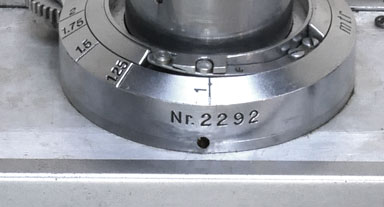
Nikkor focusing mount on a Canon NS
The Canon NS was supplied with one of two Nikkor lenses which were bayonet-monted into the Nikkor focusing mount. One was the lens most often found on the Canon S, the Nikkor 50mm f3.5.
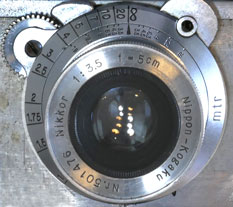
Nikkor 50mm f3.5 lens of 1939 on Canon NS
The other lens with the Canon NS was the Nikkor 50mm f4.5, always in the white face version.
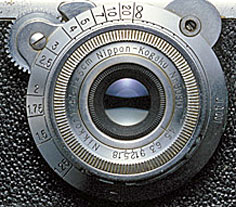
Nikkor 50mm f4.5 lens of 1939 or 1940 on Canon NS
The Canon NS, had it been available in quantity would have been an attractive camera. With the onset of a wider war for Japan (Japan already had been at war in China since 1937), photographers who wished to buy a camera needed to gain government permission. Also, although Seiki-Kogaku sought to make the Canon NS attractive by a low price, the onset of the war made this difficult. The Canon company website, covering Canon history wrote:
"To procure military funds, a special tax was levied [by the Japanese government] on material goods. As a result, the Hansa Canon’s price greatly increased from 275 yen to 350 yen. The tax rate was 10 to 20 percent. To cope with this tax rate, the Canon NS was designed with a lower price in mind. However, this idea did not permeate the market since only about 100 units were made." 4
So the Canon NS, which was attractively designed and which had been given an attractive price did not achieve the commercial success for which Seiki-Kogaku had hoped. The Canon NS was defeated by the onset of a war which was eventually to devastate all of Japanese industry.
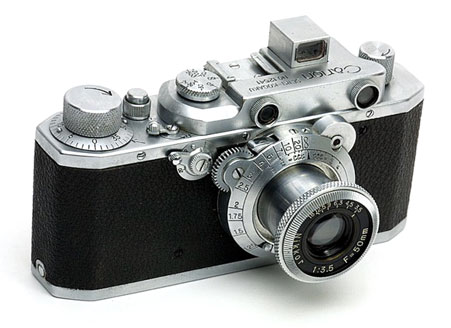
a Canon NS fitted with an early (circa 1937) black face Nikkor 50mm f3.5 lens
You can click on the links in the table below to consult other pages of the canonrangfinder.org site.
| Navigation: Click Below to Jump to Desired Subject Page | ||
|---|---|---|
| Canon Rangefinder Cameras - 1 | Canon Rangefinder Cameras - 2 | Canon Rangefinder Lenses |
| Canon Hansa | Canon IIAF, IIAX | Development Nikkor 50mm |
| Canon S | Canon IVSB2 | Canon 19mm |
| Canon J | Canon IIS2, IID2, IIF2 | Canon 25mm |
| Canon NS | Canon VT, Canon L2 | Canon 28mm |
| Canon JS | Canon L1, L3 | Canon 35mm |
| Canon S-I | Canon VT Deluxe | Canon 50mm |
| Canon J-II | Canon VL, VL2 | Canon 85mm |
| Canon S-II | Canon VI-L, VI-T | Canon 100mm |
| Canon IIB | Canon P | Canon 135mm |
| Canon III, IIC, IV | Canon 7 | Canon 200mm-1000mm |
| Canon IIIA, IVF, IVS | Canon 7s | Canon Accessories |
| Canon IIA, IID, IID1 | Nicca Rangefinders | Canon Finders |
| Canon IVSB | Minolta Rangefinders | Minolta Lenses |
| Canon IIF, IIS | Other Rangefinders | other M39 lenses |
| Go to canonrangefinder.com home page | ||
Any additions or corrections to these pages would be welcome simply by contacting this site as shown at the foot of this page .
Footnotes:
1 Dechert, Peter. Canon Rangefinder Cameras 1933-1968. Hove Collectors Books. West Sussex, United Kingdom. 1985. ISBN 0-906447-30-5.
Peter Dechert's book is the most important expert source of information regarding Canon Rangefinder Cameras.
2 Kitchingman, Peter. Canon M39 Rangefinder Lenses 1939-1971. A Collector's Guide. Published by Peter Kitchingman. Perth, Australia. 2008. ISBN 978-0-646-48144-9.
Peter Kitchingman's book is the definitive study of the more than three decades of M39 format camera lenses developed for Canon Rangefinder Cameras.
3 Nostalgic Canon Camera Book. 懐かしいキヤノン EI Publishing Co. Ltd. Tokyo, Japan. June 2003.
Peter Kitchingman's book is the definitive study of the more than three decades of M39 format camera lenses developed for Canon Rangefinder Cameras.
4 "Canon Camera Museum" history website. https://global.canon/en/c-museum/history/ published by Canon, Inc. accessed in 2019.
5 Rajner, Hans P. (author), John Wade (editor). Leica Copies. Classic Collections Publications. London, UK. ISBN 13: 9781874485056
Hans P. Rajner's book is an excellently detailed and carefully researched study of camera from around the world which used the Leica M39 lens mount and the same lens to film plane distance.
7 Dechert, Peter. Canon Single Lens Reflex Cameras 1959-1991. Historical Camera Publications. Yakima, Washington. 1992. ISBN 1-879561-04-2.
8 Tomlinson, Shawn M. The Film Photography Book. Lulu Pulbications. 2016. ISBN: 9781365263972
9 Sartorius., Ghester. Identifying Leica Lenses. Classic Camera 19. Tokyo, Japan. 2001. ISBN 4-257-12029-0
10 website http://www.nicovandijk.net/rflensmatrix.htm consulted 2019.
11 O'Reagan, Douglas M. Allied Exploitation of German Science after World War II. Johns Hopkins University Press. Baltimore, Maryland. 2019. ISBN 9781421428888
12 website www.canonrangefinder.servehttp.com consulted 2008.
13 Minolta expert Andrea Aprà has posted information on minoltarangefinders group and other groups and further detailed information by email. (thanks Andrea !)
14 website http://www.collection-appareils.fr/objectifs/ consulted 2019.
15 Small, Marc James. Non-Leitz Leica Thread-Mount Lenses. Wittig Books. Hückelhoven, Germany. 1997. ISBN 3-930359-47-2.
16 the Nikon Corporation website: https://imaging.nikon.com/history/ consulted 2019.
17 p 152. Ray, Sidney F. Photographic Lens ISBN 9780240510323
18 website http://www.rokkorfiles.com/Lens%20History.html accessed 2019
19 Katz, Jerome. The Kardon camera story: a dedication to Peter Kardon, great American patriot & pioneer. SJF Enterprises. New York, New York. 1977.
20 Baird, John. The Japaneese Camera. The History of the Japanese Camera Monograph Collection. Historical Camera Publications. Yakima, Washington. 1990. ISBN 1-879561-02-6.
21 interesting website http://www.topgabacho.jp/Topconclub/Leotax.htm accessed 2019
22 Alexander, Jeffrey Scott. Nikon and the sponsorship of Japan's optical industry by the Imperial Japanese Navy 1923-1945. MA Thesis. University of British Columbia. 2001.
23 Alexander, Jeffrey Scott. Nikon and the sponsorship of Japan's optical industry by the Imperial Japanese Navy 1923-1945. PhD Thesis. University of British Columbia. 2010.
If you have any comments or questions about this Canon Rangefinder site, please e-mail me (Larry Huffman) at e-mail address: [email protected]